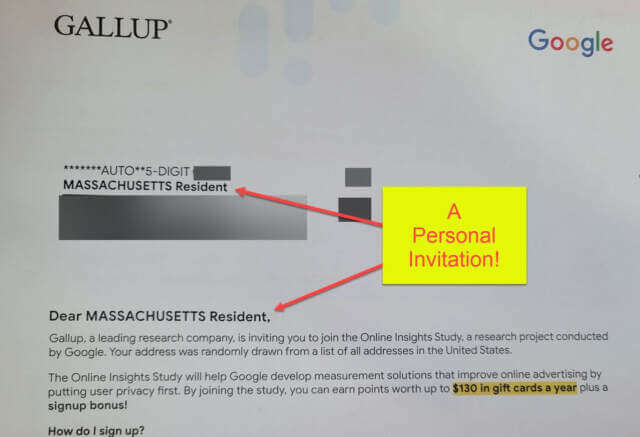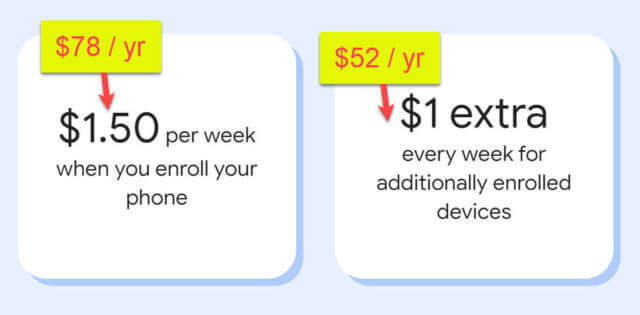Recently, I received a letter from the fine folks at Gallup and Google offering me the chance to participate in their Online Insight Study. By doing so, I can earn up to $130 in gift cards each year. Where do I sign up?! But it says, “Limited time offer. Terms and conditions apply.” Hmm…
What Is The Online Insights Study?
It is “a research project coordinated by Google” that “will help Google develop measurement solutions that improve online advertising by putting user privacy first.” Google is improving its product by putting user privacy first? Sounds interesting, but this doesn’t sound like Google! Perhaps I should look into this!
The Offer
Gallup (other than this invitation, I see no other involvement by Gallup in this study) personally selected me from all the addresses in the United States. How exclusive, how special! They must really want me! Wait a second, who is this addressed to? “Dear Massachusetts Resident”. Well, OK, I guess they will accept anyone.

Google offers up to $130/year. Hmm, what does that mean? Nothing in the letter. Off to Google’s Online Insights Study website. The offer is up to $78 per year for my phone and up to $52 for ALL my other devices. So now I need to enroll at least two devices!

The site says I’m in control (look at that reassuring image). Sounds great!

The Terms And Conditions
There are no terms and conditions anywhere in the sent letter or documents. Surely they must be on the above website. What? That’s strange! For a project putting user privacy first, there are no links to any of the terms or conditions! Apparently, Google wants me to enroll before reading them! An online search finds the following links for Terms and Privacy Policy. Note: I am not a lawyer, this analysis is based on my reading of these documents.
Google will install “meters” on my devices. Generally, a meter (speedometer, thermometer, etc.) is a device that measures one item. But Google is actually installing applications capable of collecting much more than that!
Collecting What?
Google will collect and record interactions with my device. This includes content (YES CONTENT!) and advertising.
Here is a much-abbreviated list:
- Internet Activity – including every web page and all my interactions
- Apps & operating systems – Every interaction with any application, widget, and the operating system
- Information – All information I provide or input when visiting websites or using applications
- Device information – All information about my device when it is powered on including location information and diagnostic information
OK, so EVERYTHING? No, Google promises not to record my passwords. So everything except passwords. Remember, Google is putting user privacy first!
Non-Device Data
Not only will Google collect EVERYTHING (except passwords) from my devices, but it will combine this information with information obtained from third parties (academic institutions, advertisers, publishers, data brokers, programming networks, and other entities that study consumer behavior and audience measurement).
Google will then combine this data and the study data with non-identifying information collected from additional third parties. Now, “pseudonymous information” may become personally identifiable and be used to identify me. Again, putting user privacy first!
Will My Data Be Shared?
Yup! Google will share data with its Study Partners or other third parties, such as academic institutions, advertisers, publishers, data brokers, programming networks, and other entities studying consumer behavior and audience measurement.
But My Data Is Stored Securely?
Nope! Google’s security measures apply “only to Google’s storage of data on its own systems. They do not apply to data on other systems that are not owned or controlled by Google”.
At Least I Still Own My Data!
Nope! “Google (or Google’s licensors) own all legal rights, title, and interest in and to the Study, including any intellectual property rights in the Study (whether those rights happen to be registered or not, and wherever in the world those rights may exist)”.
If Something Happens Am I Covered?
Nope! “YOUR PARTICIPATION IN THE STUDY IS AT YOUR SOLE RISK.” And, “GOOGLE, AND GOOGLE’S SUPPLIERS, DISTRIBUTORS, AND STUDY PARTNERS, WILL NOT BE RESPONSIBLE FOR LOST PROFITS, REVENUES, OR DATA, FINANCIAL LOSSES OR INDIRECT, SPECIAL, CONSEQUENTIAL, EXEMPLARY, OR PUNITIVE DAMAGES.” BTW, that is Google shouting!
Bottom Line
In Google’s Online Insights Study, every month I have the potential to earn the equivalent of a cup or two of coffee. In exchange, I just need to give up ALL my information (except passwords) and have it be shared with practically anyone. I may no longer own my data, my data may not be stored securely, and I have no recourse if anything happens. It is good that Google is putting user privacy first! Let me know in the comments whether you will be signing up.
—

Like my Dad used to say , if something sounds too good to be true, then it usually is. I wouldn’t touch it with a twenty foot stick.
You are virtually allowing Google to install a virus on your system “per se” that will follow every move you make on your system and internet …… and that part about your passwords being safe? ….. don’t fall for it.
Hi Ed,
I’m going to take Google’s word that they don’t record passwords. For those who join, Google will have all the individual’s data, device info, application data, and content as well as their individual interactions. Why would Google need the passwords, they have everything already!
so if i pay for anything online,are my card numbers or bank account info exposed to anybody?????i signed up to this yesterday.
Hi Jenn,
Is Google actually collecting that information? I don’t know.
But, the terms state that they can collect and record all:
Internet Activity – including every web page and interactions.
Information – All information I provide or input when visiting websites or using applications.
Hmmmm, doesn’t sound like something worth taking the chance on I use MANY reward apps & they’ve all been legit & absolutely great for gifts cards, PayPal,etc. that’s why I signed up for this 1 but unsure about if they’re gonna get my banking or card info is kinda unsettling,I don’t wanna wake up 1 day to a zero balance in my bank account!
This is not the sort of offer I’d give three seconds of time to consider, but I know people who would. I’m sharing a link to this page with pretty much everyone I know. Thanks for shedding light into this dark corner.
Hey GrannyGeek,
The problem is Google does not give the terms, conditions or privacy policy in the documents they send or even have a link to these items on their website. Just an offer to earn money (however small the amount is) and a notice that the user is in control. Although people like you and I will, most people will not go out of their way to search for this information before signing up My guess is that there is a check box somewhere agreeing that you have read the information before hitting the final acceptance button, but most will just click the button.
Thanks for sharing links to our site.
Good info John….Google people aint gonna like you !!
I especially like your “Bottom Line” summary….terrific way to end a lengthy piece which ppl may not have time or patience to read in detail. The summary is short and sweet but to be as useful as possible it needs to hit key points clearly and a limited number. I myself prefer to use bullets in such summaries but I too use it in my blogging and newsletter work with a different title (in icon form) “the Last Word”
Hi Richard,
I’m glad you liked the article and thanks for the compliment. Regarding the Google people, as I said in the article, I am not a lawyer, but these are the conclusions I came to after reading their documents.
I’m so glad I used a search engine to research this offer before I signed up! I am desperately in need of extra income and thought it could be a possibility. As Ed said, “if something sounds too good to be true, then it usually is”.
Thanks for doing the research for the rest of us! I found it suspect that there was NO FAQ section or ANY way to read their terms until (I presume) one has signed up for the study. UGH!!
And playing games for money or gift cards also seems suspect to me. Too good to be true?
Hi Jennifer,
I am glad you found the article useful. Now that you have found Daves Computer Tips, I hope that you will stick around for more.
Got a postcard invite in the mail today. Was wondering the ‘catch’ and how much, if any, Gallup was actually involved. Thank you for the great summary, saved me time from trying to track it all down and read it as I knew something was up with it!
Hi Sharon,
I’m glad you found my article useful.
Totally agree I read the terms and thought not a goo Idea… then I googled downsides and got your article … thank you for confirming what I was already thinking
Hi Barbara,
I’m glad that you found the article interesting. I am surprised you found in Googling though, Google doesn’t seem very fond of this article. See
https://davescomputertips.com/mojeek-a-search-alternative/
thanks
Hi Ajit, your welcome.